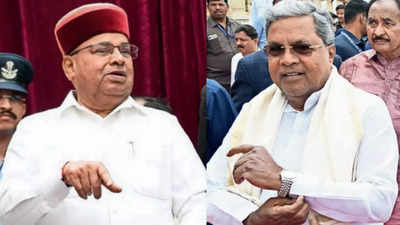- News
- City News
- bengaluru News
- Karnataka Muda scam: Key details behind the ongoing controversy
Trending
Karnataka Muda scam: Key details behind the ongoing controversy
The Karnataka high court will decide on CM Siddaramaiah's petition against Governor Gehlot's sanction for a probe into the MUDA alternative-site allotment case. The controversy centers on alleged irregularities in land allotments, with opposition parties estimating the scam to be worth between Rs 3,000 crore and Rs 4,000 crore.

Karnataka governor Thaawar Chand Gehlot and CM Siddaramaiah
The governor's sanction was granted under "Section 17A of the Prevention of Corruption Act, 1988, and Section 218 of the Bharatiya Nagarik Suraksha Sanhita, 2023," following petitions submitted by activists Pradeep Kumar SP, TJ Abraham, and Snehamayi Krishna.

The high court had previously granted temporary relief to the chief minister on August 19, instructing a special court in Bengaluru to postpone further proceedings and refrain from taking any precipitative action based on the governor's sanction.
While many senior lawyers including Supreme Court lawyer Abhishek Manu Singhvi argued for Siddaramaiah, solicitor general Tushar Mehta argued for governor Thawar Chand Gehlot.
Here's all you need to know about the raging controversy:
What is the Muda scam controversy ?
The controversy revolves around the alleged irregularities in the allotment of compensatory sites. The focal point of the controversy is a 3.2-acre tract of land that was gifted to Parvathi, the chief minister's wife, by her brother Mallikarjunaswamy in 2010.
After Muda acquired the land, Parvathi requested compensation and was consequently allotted 14 plots. It is alleged that these plots hold significantly higher value compared to the original parcel of land.
The opposition parties claim that the total value of the scam could potentially fall within the range of Rs 3,000 crore to Rs 4,000 crore.
Timeline:
- December 2023: Urban development department instructs the Mysore Urban Development Authority (Muda) to halt site allotments under the 50:50 scheme due to severe violations of regulations.
- March 2024: Despite the earlier directives, Muda continued the allotments, prompting the department to issue another letter.
- April 2024: Muda delays its response, citing model code of conduct for Lok Sabha polls.
- May 2024: Muda chairman K Marigowda requests the department to department to investigate the allotments under the 50:50 scheme.
- June 2024 : Local newspapers begin publishing articles highlighting the irregularities and potential rackets in the allotment of alternative sites in prime locations.
- June 2024 : An RTI activist revealed the alleged involvement of politicians, including Chief Minister Siddaramaiah's wife, Parvati.
- June 2024:The state government appoints a four-member officers' committee to investigate the matter.
- July 2024:BJP MLC AH Vishwanath claims that CM's wife has received several sites in a posh locality.
- July 2024: Siddaramaiah responds by stating that alternative sites were allotted to his wife because Muda had encroached on land gifted by her brother and developed a layout there.
- July 2024: Siddaramaiah offers to return the sites if Muda compensates him with Rs 62 crore.
- July 15, 2024: Government establishes a commission of inquiry, led by retired High Court judge Justice PN Desai.
- July 18, 2024: Social activist TJ Abraham files complaint with
Lokayukta police in Mysuru. - July 21, 2024: TJ Abraham files petition with governor seeking sanction for prosecution of chief minister. Two additional petitions seeking prosecution are also filed.
- July 26, 2024: Governor issues showcause notice to CM.
- July 15-26, 2024: During monsoon session, BJP and JD(S) demand a debate on the raging issue, which the speaker denies permission for.
- Aug 3-10, 2024: BJP and JD(S) members embark on padayatra from Bengaluru to Mysuru to protest and demand CM's resignation, while the
Congress held counter-rallies in response. - Aug 1, 2024: Cabinet advises governor to withdraw showcause notice, claiming it is illegal and rejecting Abraham’s petition
- Aug 2024: Activist Shehamayi Krishna from Mysuru moves special court for people’s representatives seeking independent probe.
- Aug 17, 2024:Governor grants sanction for prosecution of Siddaramaiah.
Chief minister Siddaramaiah(76), is now the second Karnataka CM to face prosecution while in office, following BJP's BS Yediyurappa in 2011. The irony lies in the fact that Siddaramaiah, who once demanded Yediyurappa's resignation as opposition leader, is now facing similar charges and increasing calls for his own resignation. The current circumstances bear a striking resemblance to the events that transpired in 2011.
In the case of Yediyurappa, the prosecution was approved by the then governor HR Bhardwaj on December 12, 2010, based on a petition submitted by advocates Sirajin Basha and KN Balaraj. The sanction was granted under "Section 19(1) of the Prevention of Corruption Act1988, and Section 197 of Criminal Procedure Code-1973." This decision sparked controversy and led to widespread protests by the BJP.
Yediyurappa did not immediately step down despite the pressure. He convened a cabinet meeting to denounce the governor's decision and engaged in a prolonged legal battle. After months of political pressure and an indictment by the then Lokayukta Santosh Hegde in the illegal mining scandal, he ultimately resigned from his position.
The sanction against Siddaramaiah is another rare but notable instance in Indian political history where governors have taken decisive actions against chief ministers. Similar situations have arisen in other states, such as the cases of J Jayalalithaa, AR Antulay, and Lalu Prasad Yadav, all of whom resigned after the sanction to prosecute them was granted.
End of Article
FOLLOW US ON SOCIAL MEDIA











